If a film is remotely popular, it will attract diehard devotees and determined detractors. Fights will ensue about whether the film is good or not, and whether you’re a terrible person for liking it or disliking it; just look at the discussion still going around about The Last Jedi. Aquaman, part of the permanently ruffled DCEU, has inspired its fair share of these factions, and Director James Wan has taken to Twitter to address both sides of the debate, which is getting a bit heated.
It has come to my attention that some folks are getting harassed by some fans for not liking AQM. Please don’t do that. Not the kind of support I want. Be respectful. Vice versa, it’s ok to not like my film, but there’s no need to attack me personally, or tag me on hates. Peace✌️
— James Wan (@creepypuppet) December 30, 2018
Wan’s tweet is a kind reminder that, yeah, the people on the other end of your snarky tweets, either in defense of or attacking a film, are real people. I’m not talking about people espousing toxic, racist views, either; I’m talking about someone you might disagree with on a character or scene. Sometimes, what we do impacts them if we’re being a jerk on the Internet. This especially goes for @-ing creators with your opinions on how much they suck.
Twitter has been discussing what constitutes the appropriate time to @ someone with a negative opinion, and the consensus is trending towards “let’s try not to.” Several figures have tweeted about this recently, especially following Wan’s comments and a recent incident in which Zoe Kazan replied to a person who @-ed her in a tweet that said she was “frustrating to watch” in The Ballad of Buster Scruggs.
Kazan, in reply to the tweet, which has since been deleted, said, “Solid example of when not to tag an artist in your tweet about their work. … Like I am not a restaurant, this is not yelp, I don’t need to know that you found the meal overly salty.” After the tweeter in question apologized, she tweeted, “ok i think we all got that etiquette lesson, erasing the tweet. to recap: let’s try not to say things to each other online that wouldn’t be rude/antisocial to say to someone’s face? seems…basic.”
ok i think we all got that etiquette lesson, erasing the tweet. to recap: let’s try not to say things to each other online that wouldn’t be rude/antisocial to say to someone’s face? seems…basic.
— zoe kazan (@zoeinthecities) December 28, 2018
Other examples of tweets in the same vein are listed below.
Hello, general note of polite Twitter decorum – if you don’t like a TV show/film/book/album etc, PLEASE DON’T @ the creator and tell them. It’s incredibly aggressive, hurtful, selfish and destructive. If we want to know what people think, we will search for it ourselves. Thanks!
— Greg Jenner (@greg_jenner) December 30, 2018
This seems weirdly controversial on this platform tonight, but if anyone fancies @ – ing me to a negative review of my work, that’s an immediate blocking offence. Creators, for their mental health, *choose* when to access the vast ocean of bad reviews.
— Paul_Cornell (@Paul_Cornell) December 30, 2018
The last line is the key bit the “Can’t you take criticism” always ignore. The ability to take criticism is not the same as being open to criticism at every second of the day. https://t.co/rNeBRzfxh8
— Kieron Gillen (@kierongillen) December 31, 2018
Obviously, call out crappy behavior, but there’s a difference between @-ing someone because of a harmful viewpoint and @-ing them to tell them you hate their art and think it sucks. Be kinder in 2018, because we’re all human in the end, and it’s toxic to see a wellspring of negativity in your mentions.
(via The Hollywood Reporter, image: DC)
Want more stories like this? Become a subscriber and support the site!
—The Mary Sue has a strict comment policy that forbids, but is not limited to, personal insults toward anyone, hate speech, and trolling.—









Published: Dec 31, 2018 12:41 pm